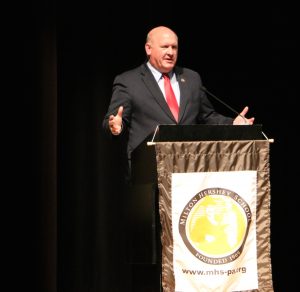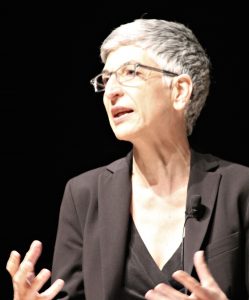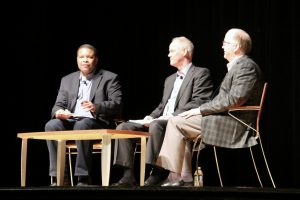Career and Technical Education Conference Highlights
CTE Conference Speakers and Panelists Discuss Strategies for Connecting Businesses and Schools
On April 8, 2016, Milton Hershey School partnered with Opportunity America, a nationally recognized Washington D.C. think tank and policy shop which promotes economic mobility, to host a Career and Technical Education conference. To open the conference, two students spoke about their experiences in the CTE program at Milton Hershey School.
Sophomore Katie Muir talked about the Law, Public Safety & Security pathway and the importance of integrity and moral character. She also mentioned it’s difficult to feel secure about the future, but MHS eases her uncertainty. Senior Tyeair Diggs shared his experience with the Graphic Communication Technologies pathway and how he learned to be creative and curious in everything he does.

Public Session Speakers
After hearing from MHS students, Congressman Charlie Dent who serves the 15th District of Pennsylvania discussed his work on the Appropriations Committee. He explained the significance of the Every Student Succeeds Act (ESSA) – an act that gives states flexibility with spending through block grants.
Next, Congressman G.T. Thompson who serves the 5th District of Pennsylvania spoke about the lack of inspiration many kids feel in school and the lack of opportunity for people living in poverty. He believes CTE training is a solution if we can make it work on a large scale. Thompson also shared his advocacy for the Carl D. Perkins CTE Improvement Act, which ensures CTE programs are academically rigorous and fall in line with the needs of business and industry.
John Stossel, an investigative reporter for Fox Business Network, followed the Congressmen and challenged the audience to question rules set forth by experts.
“Energy is lost by trying to follow rules. Rules make it so hard to try something new,” Stossel said. “You can’t start new things without permission first, and it’s strangling economic growth.”
After reflecting on unemployment numbers and government spending, Stossel argued that competition is what leads to prosperity. As fields change, he encouraged students to try new things and create opportunities that didn’t exist in the past.
Public Session Panelists
Tamar Jacoby, president of Opportunity America, opened the CTE discussion to panel members and moderated the dialogue about connecting schools and employers. Alyssa Cherkin, corporate citizenship leader at Deloitte LLP, began by sharing her experience with a program created in 2007 at Deloitte’s greater Philadelphia office. The company invested in the region and gave employees a sense of purpose by creating a mentoring program with local students.
“If the region as a whole isn’t strong and education isn’t strong, everyone loses,” Cherkin said.
 Laura Shubilla, founder of Building 21, continued by discussing her work with employers in Philadelphia. She advocated for building authentic relationships across organizations with differing perspectives. She also urged educators to work with employers to bring real-world problems into schools, so students can grapple with them and truly understand the question of why they are learning something.
Laura Shubilla, founder of Building 21, continued by discussing her work with employers in Philadelphia. She advocated for building authentic relationships across organizations with differing perspectives. She also urged educators to work with employers to bring real-world problems into schools, so students can grapple with them and truly understand the question of why they are learning something.
To stress the importance of giving students tangible work with real supervisors, Nancy Hoffman, vice president for program and talent development at Jobs for the Future, shared three major benefits for businesses partnering with schools:
- It’s an opportunity for employees to give back to the community.
- It prepares a pipeline of qualified workers.
- It helps secure the economic well-being of the labor market.
Gary Hoachlander, president of ConnectEd: The California Center for College and Career, argued that the responsibility of teaching should no longer rest entirely on professional teachers. He believes we need to engage the employer community so everyone can be “teachers.” He is confident that students will be more successful in college with a CTE foundation because they will have a better idea of why they are there.
To conclude the panel session, James R. Stone III, director of the National Research Center for Career and Technical Education (NRCCTE), talked about curriculum. He encouraged employers to advise schools on curriculum to ensure it’s linked to the credentials and skills they value. He also discussed advisement for students on all levels – from mentoring and job shadowing to apprenticeships with productive, real work.
Educator and Employer Q&A
 Mark Hall from WHTM-TV moderated the final segment of the public session. President Pete Gurt ‘85 from Milton Hershey School and CEO & President Bill Simpson of Hershey Entertainment & Resorts answered questions about their advancements and challenges with the school/employer relationship.
Mark Hall from WHTM-TV moderated the final segment of the public session. President Pete Gurt ‘85 from Milton Hershey School and CEO & President Bill Simpson of Hershey Entertainment & Resorts answered questions about their advancements and challenges with the school/employer relationship.
Gurt started by describing the CTE program at Milton Hershey School where students are exposed to careers as early as fourth grade. The goal is to give every student an authentic work experience before they graduate.
“I think all students and all high schools should really think about how early we’re exposing students to a variety of career possibilities and then give them those opportunities,” Gurt said.
Simpson added that employers should learn the aspirations of students. Working with students shouldn’t be viewed as charity work, either – his team views the partnership as significant work that also benefits the business. He argued his employees also perform their best when they know they are mentoring students.
MHS students have a chance to rotate through all careers at Hershey Entertainment & Resorts. Before placing students with the company, Gurt said students must take accountability and create a learning plan with their supervisor. The partners work to teach daily skills, such as showing up, working hard, giving a full day’s effort, and reflecting on the contribution that was made to the organization.
Gurt concluded by explaining the career pathway approach at MHS. Students experiment with their interest areas, but once they decide on a pathway, MHS educators help them focus and follow through.
“It gives them a clear idea, hope and commitment to the sacrifice it’s going to take to succeed,” Gurt said.
Franchesca Ramirez, an MHS senior in the Law, Public Safety & Security pathway, ended the public session by sharing her CTE experience. After enrolling at MHS in sixth grade, the Spartan internship program helped her decide to work toward a job as a criminal prosecutor. Because of MHS, Franchesca said she has the tools and confidence to pursue her dream.
Learn more about the important work our panelists and speakers are doing for Career and Technical Education across the country.

